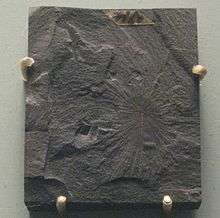Choia
| Choia Temporal range: Cambrian Stage 3–Arenig[1] | |
|---|---|
 | |
| Choia carteri | |
| Scientific classification | |
| Kingdom: | Animalia |
| Phylum: | Porifera |
| Class: | Demospongiae |
| Order: | Monaxonida |
| Family: | Choiidae |
| Genus: | Choia |
| Type species | |
| Choia carteri Walcott 1920 | |
| Species | |
| |
Choia is a genus of extinct demosponge ranging from the Cambrian until the Lower Ordovician periods. Fossils of Choia have been found in the Burgess Shale in British Columbia; the Maotianshan shales of China; the Wheeler Shale in Utah; and the Lower Ordovician Fezouata formation.[2]
Life habit
Choia was originally thought to be not attached to the sea bed: the living animal was originally thought to rest directly on the substrate, with the radiating spines from the edge of its flattish, conical body, giving an appearance not unlike that of the peak of a big top, with guy lines. Recently discovered fossils from Lower Ordovician Morocco show that the living animal was actually suspended high above the seafloor, attached via stalk-like spines derived from spicules.[3] Water is assumed to have entered the sponge parallel to the spines, being expelled, presumably, from a central opening.[4] Species reached up to an average of 28 mm in diameter.[4]
Presence in the Greater Phyllopod Bed
127 specimens of Choia are known from the Greater Phyllopod bed, where they comprise 0.2% of the community.[5]
External links
- "Choia carteri". Burgess Shale Fossil Gallery. Virtual Museum of Canada. 2011.
- Picture of C. utahensis fossil
References
- ↑ Botting, J. (2007). "'Cambrian' demosponges in the Ordovician of Morocco: Insights into the early evolutionary history of sponges". Geobios. 40 (6): 737–748. doi:10.1016/j.geobios.2007.02.006.
- 1 2 Van Roy, P.; Orr, P. J.; Botting, J. P.; Muir, L. A.; Vinther, J.; Lefebvre, B.; Hariri, K. E.; Briggs, D. E. G. (2010). "Ordovician faunas of Burgess Shale type". Nature. 465 (7295): 215–8. Bibcode:2010Natur.465..215V. doi:10.1038/nature09038. PMID 20463737.
- ↑ Van Roy, Peter (2006). Non-trilobite arthropods from the Ordovician of Morocco. Ghent: Ghent University. pp. 38–39.
- 1 2 Briggs, D.E.G.; Erwin, D.H.; Collier, F.J. (1995), Fossils of the Burgess Shale, Washington: Smithsonian Inst Press, ISBN 1-56098-659-X, OCLC 231793738
- ↑ Caron, Jean-Bernard; Jackson, Donald A. (October 2006). "Taphonomy of the Greater Phyllopod Bed community, Burgess Shale". PALAIOS. 21 (5): 451–65. doi:10.2110/palo.2003.P05-070R. JSTOR 20173022.